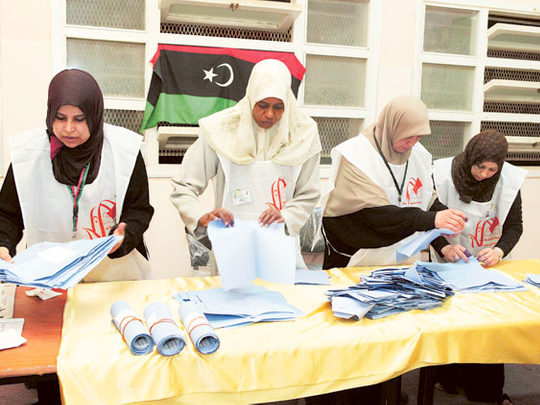
Tripoli: Turnout in Libya’s first free national election in decades after the ouster of dictator Muammar Gaddafi was 60 per cent, the electoral commission said Saturday, quoting preliminary figures.
“We are continuing to receive reports (from polling stations), but the number of voters has reached 1.6 million, 60 per cent of voters,” the head of the commission, Nouri Al Abbar, told reporters.
Al Abbar said that “despite a day of crisis management” only 24 out of 1,554 polling stations had been unable to open their doors due to acts of sabotage, notably in the restive east of the country.
Earlier, he said around 100 stations had not opened on time “for security reasons”.
The commission pushed back closing times for those stations affected until 1800 GMT.
The bulk of Libya’s population and registered electorate is concentrated in the capital, which lies in the west of the oil-rich desert country, and in the eastern city of Benghazi.
Libyans on Saturday voted for a General National Congress, a 200-member legislative assembly which will steer the country through a transition period. Turnout was above 60 percent, the electoral commission said.
A total of 80 seats in the incoming congress are reserved for political entities while the remaining 120 are held for individual candidates, some of whom are openly allied to specific parties.
Altogether, 3,707 candidates stood in 72 districts nationwide.
Mohammad Sawan, who heads the Justice and Construction party. told AFP the results were mixed in terms of which party was performing better at the polls when it comes down to allies and sympathisers who are running as individual candidates.
Votes were still being tallied by Libya’s electoral commission with preliminary results expected by Monday night or early on Tuesday.
Private channel Al Assima TV reported that the liberal coalition was far ahead in the capital, scooping 80 per cent in the district of Tripoli Centre and 90 per cent in the impoverished district of Abu Slim.
Its lead, the channel said, was also strong in the troubled east, with preliminary figures giving it 70 per cent in Benghazi and 80 per cent in Al Bayda, hometown of Libya’s interim leader Mustafa Abdul Jalil.
These figures were unofficial, however.
“The first winner is the Libyan people,” declared a beaming Nuri Abbar, head of the electoral commission, at the end of a rollercoaster polling day which was briefly clouded by unrest in the east.
Apart from acts of sabotage in the restive east and one death in Ajdabiya when unknown gunmen opened fire near a polling station, the vote was held in a festive atmosphere in the main cities.
Leading a chorus of praise, US President Barack Obama called the vote “another milestone” in Libya’s transition to democracy.
“On behalf of the American people, I extend my congratulations to the people of Libya for another milestone on their extraordinary transition to democracy,” he said.
“Today’s historic election underscores that the future of Libya is in the hands of the Libyan people.”
Britain’s Foreign Secretary William Hague said the vote was a “landmark,” while his Italian counterpart Giulio Terzi hailed a “watershed” moment for its former colony and crucial energy source.
Alexander Graf Lambsdorff, who heads a team of 21 European Union observers, said large numbers of Libyans had voted “peacefully and free of fear and intimidation”.
The make-up of the congress being elected has been a matter of heated debate, with factions such as the federalist movement in the east calling for more seats and staging acts of sabotage both before and during the elections.
Libya has not seen national elections since the era of the late King Idris, whom Kadhafi deposed in a bloodless coup in 1969.
Political parties were banned as an act of treason under Kadhafi’s iron-fisted rule. On Saturday, 142 parties fielded candidates.











